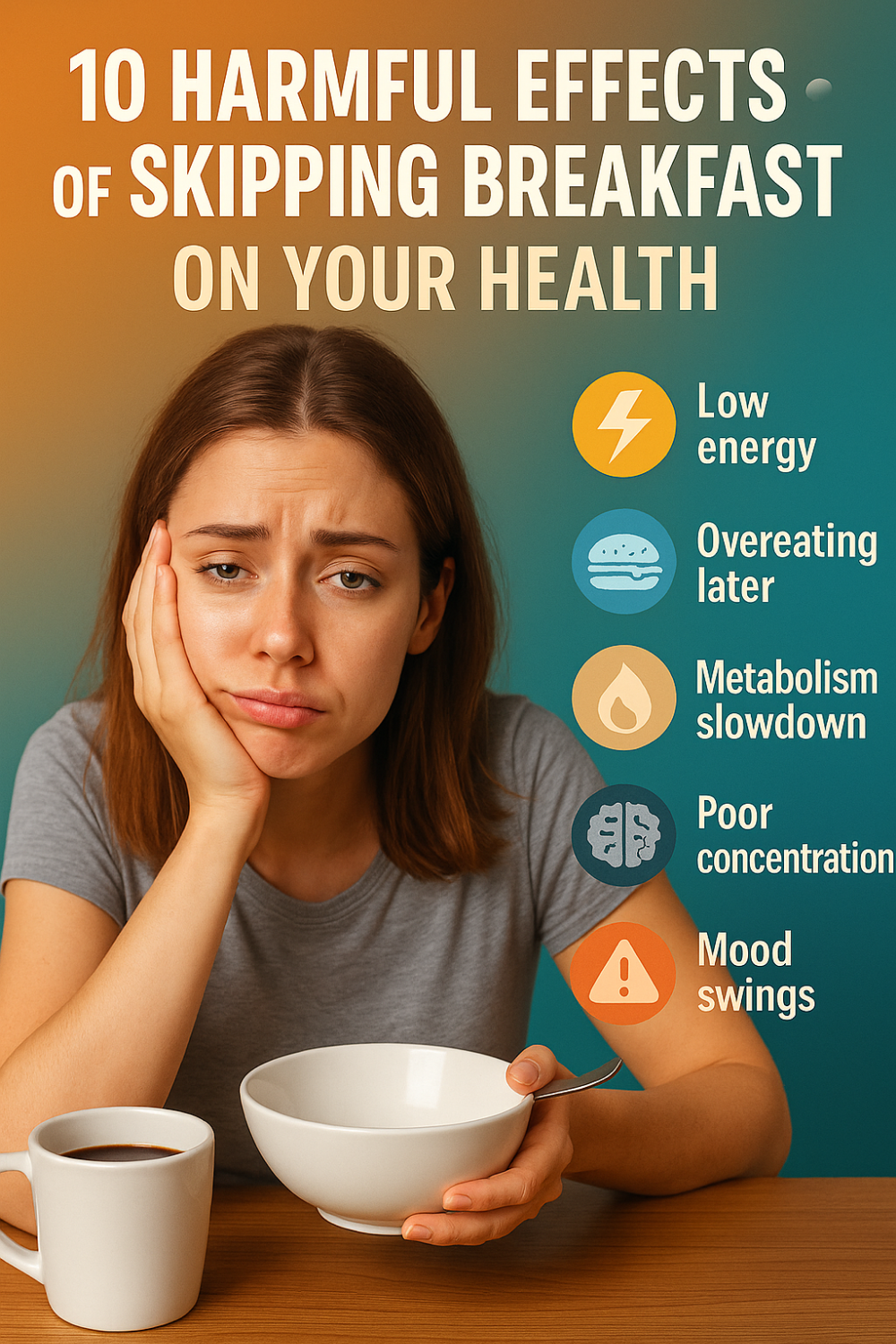You’ve probably heard that breakfast is the most important meal of the day, but do you know why? Skipping breakfast can affect far more than your appetite—it impacts your energy levels, concentration, metabolism, and even your overall health. Eating a balanced breakfast provides your body with essential nutrients and energy after overnight fasting. Here’s exactly how missing your morning meal could negatively affect your health and productivity.

Why is Breakfast Important?
Breakfast replenishes glucose and vital nutrients, jumpstarts metabolism, and enhances cognitive functions. A balanced breakfast stabilizes blood sugar, reduces cravings, and provides sustained energy throughout the day.
10 Negative Effects of Skipping Breakfast
1. Reduced Energy and Fatigue
When you skip breakfast, your blood sugar drops, leaving you sluggish and low on energy. Starting your day with a nutritious meal ensures your brain and muscles receive the glucose needed for peak performance.
2. Poor Concentration and Cognitive Performance
A morning meal boosts cognitive function, memory, and alertness. Without it, you might struggle with focus, decision-making, and learning efficiency—impacting your work or studies significantly.
3. Increased Weight Gain and Obesity Risk
Surprisingly, skipping breakfast can lead to weight gain. Missing meals often causes overeating later due to increased hunger and cravings for sugary or fatty foods. Regular breakfast eaters typically have healthier body weights and BMIs.
4. Higher Risk of Heart Disease
Regularly skipping breakfast can lead to elevated cholesterol levels, hypertension, and increased inflammation. Studies show a correlation between breakfast skipping and higher cardiovascular risks over time.
5. Metabolic Slowdown
Eating breakfast kickstarts your metabolism. If you consistently skip breakfast, your body may enter starvation mode, slowing metabolism and making weight management more difficult.
6. Higher Risk of Type 2 Diabetes
Skipping breakfast frequently can lead to insulin resistance. Irregular blood sugar fluctuations increase diabetes risk over time, making breakfast essential for maintaining stable glucose levels.
7. Increased Stress Hormone Levels
Without breakfast, your body releases more cortisol, the stress hormone, to compensate for low blood sugar. This can cause anxiety, irritability, and mood swings throughout the day.
8. Nutrient Deficiencies
Breakfast typically provides crucial nutrients like fiber, calcium, iron, and vitamins (especially vitamin B complex). Skipping breakfast regularly can lead to deficiencies that affect immunity, bone density, and overall health.
9. Greater Risk of Migraines and Headaches
Low blood sugar triggered by skipping breakfast can lead to headaches or migraines. Starting the day with balanced meals prevents blood sugar drops and keeps headaches at bay.
10. Digestive Issues
Skipping breakfast disrupts digestion rhythms, causing irregular bowel movements or constipation. A consistent breakfast routine helps your digestive system function optimally.
How to Incorporate Breakfast Easily into Your Routine
Breakfast doesn’t have to be complicated or time-consuming. Here are simple ideas to integrate breakfast effortlessly:
- Overnight Oats: Prep oats with milk or yogurt, nuts, and fruits the night before.
- Quick Smoothies: Blend protein powder, spinach, berries, and nut butter for a nutritious drink.
- Egg Muffins: Prepare eggs with vegetables in muffin trays ahead of time for grab-and-go convenience.
- Fruit & Nut Butter: Apple slices or bananas paired with almond butter offer quick, balanced nutrition.
- Whole Grain Toast: Top with avocado, eggs, or cottage cheese for healthy fats and proteins.
Tips to Ensure You Don’t Skip Breakfast
- Meal Prep Ahead: Prepare ingredients or meals the night before.
- Set Reminders: Use your phone or an app to remind you each morning.
- Make it Enjoyable: Choose breakfast foods you genuinely enjoy to boost motivation.
- Start Small: Even a small snack is better than nothing—gradually increase your breakfast portions.
Balanced Breakfast Ideas
A balanced breakfast includes proteins, healthy fats, fiber, and complex carbohydrates:
- Oatmeal Bowl: Oats with fruits, nuts, seeds, and a dollop of yogurt.
- Egg and Veggie Scramble: Eggs scrambled with spinach, tomatoes, peppers, and whole-grain toast.
- Greek Yogurt Parfait: Layer yogurt with granola, berries, and chia seeds.
- Whole Grain Pancakes: Top with almond butter, banana slices, and berries.
- Smoothie Bowl: Blend your favorite fruits with spinach, protein powder, and seeds, then top with granola.
Who Should Never Skip Breakfast?
While breakfast benefits everyone, these groups particularly need to ensure they eat regularly:
- Children and Adolescents: Essential for growth, cognitive function, and school performance.
- Pregnant or Nursing Women: Vital nutrients support maternal health and baby’s development.
- Individuals with Diabetes or Metabolic Disorders: Essential for maintaining stable blood sugar levels.
- Athletes or Active Individuals: Needed to support intense physical activity and recovery.
Common Breakfast Myths Debunked
- Myth: “Skipping breakfast saves calories.”
Truth: It typically results in overeating later, making calorie control harder. - Myth: “Skipping breakfast boosts weight loss.”
Truth: Regular breakfast eaters maintain healthier weights and BMIs. - Myth: “Breakfast needs to be a large meal.”
Truth: Even a small, balanced snack helps regulate hunger and provides energy.
Conclusion
Skipping breakfast might seem like a harmless way to save time or cut calories, but it can negatively impact energy levels, cognitive function, metabolism, heart health, and nutrient intake. A balanced, nutritious breakfast supports better concentration, weight management, stable blood sugar levels, and overall health. Make breakfast a daily habit—it’s a simple, effective way to improve your well-being.
Frequently Asked Questions
Is it harmful to occasionally skip breakfast?
Occasional skipping won’t drastically impact your health. However, making breakfast a daily habit provides more consistent long-term benefits.
What’s the ideal time to have breakfast?
Ideally, consume breakfast within two hours of waking up to optimize energy and metabolism.
Can skipping breakfast cause anxiety?
Yes, skipping meals, especially breakfast, can trigger anxiety and irritability due to blood sugar fluctuations and elevated cortisol levels.
Should you eat breakfast even if you’re not hungry?
It’s beneficial to have a small, nutrient-dense snack even if not very hungry, as it stabilizes blood sugar and prevents mid-day cravings.
What happens to your metabolism if you skip breakfast frequently?
Regular breakfast-skipping slows metabolism over time, potentially leading to weight gain and difficulty managing body weight effectively.